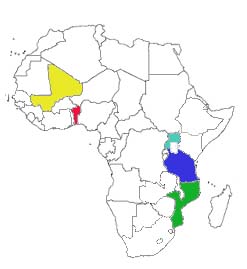


|
|
|
Topics
|
The six pilot projects sponsored by IDRC, the ITU and UNESCO/DANIDA, in collaboration with other international partners (British Council, FAO, UNDP, WHO), are sited in five different Sub-Saharan African countries.
The MCT sites for each of the five projects were selected in each country by the national authorities on the basis of local needs and initiatives, development priorities and available infrastructure are as follows: - Benin (Malanville – a town of about 26,000 in the lightly populated far north of the country) - Mali (Timbuktu – a town of about 30,000 and regional seat in the desert north) - Mozambique (Manhiça and Namaacha – towns of 22,000 and 10,000 close to the capital, Maputo) - Tanzania (Sengerema – a town of about 45,000 on Lake Victoria) - Uganda (Nakaseke – a rural village of about 1000, located at 50 km north of the capital, Kampala) A final project evaluation and impact assessment, involving all of the six telecentres, is currently underway and it is expected to be completed in 2003. |


